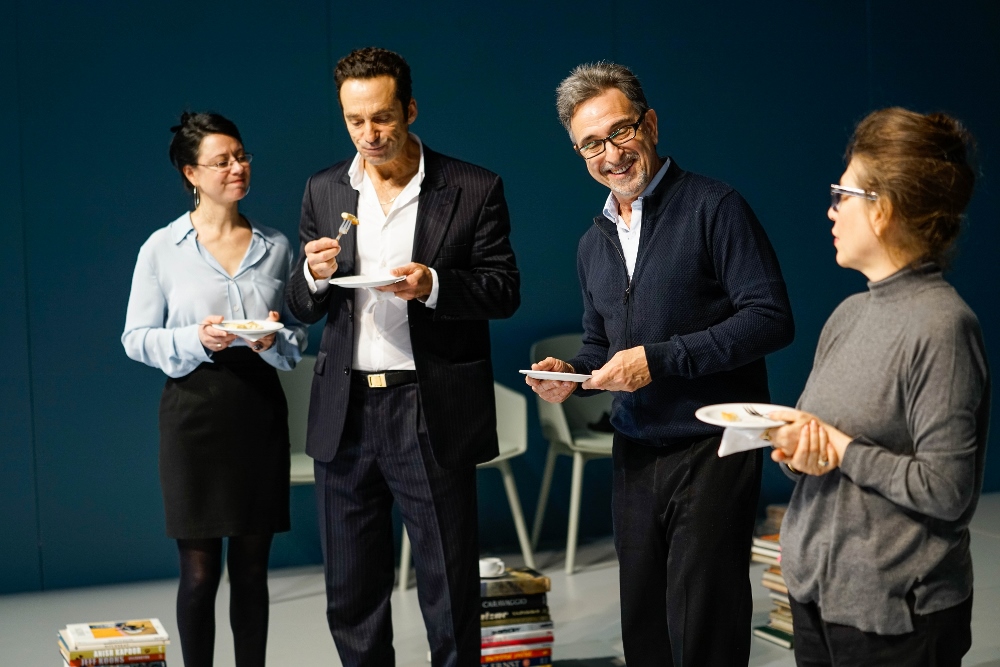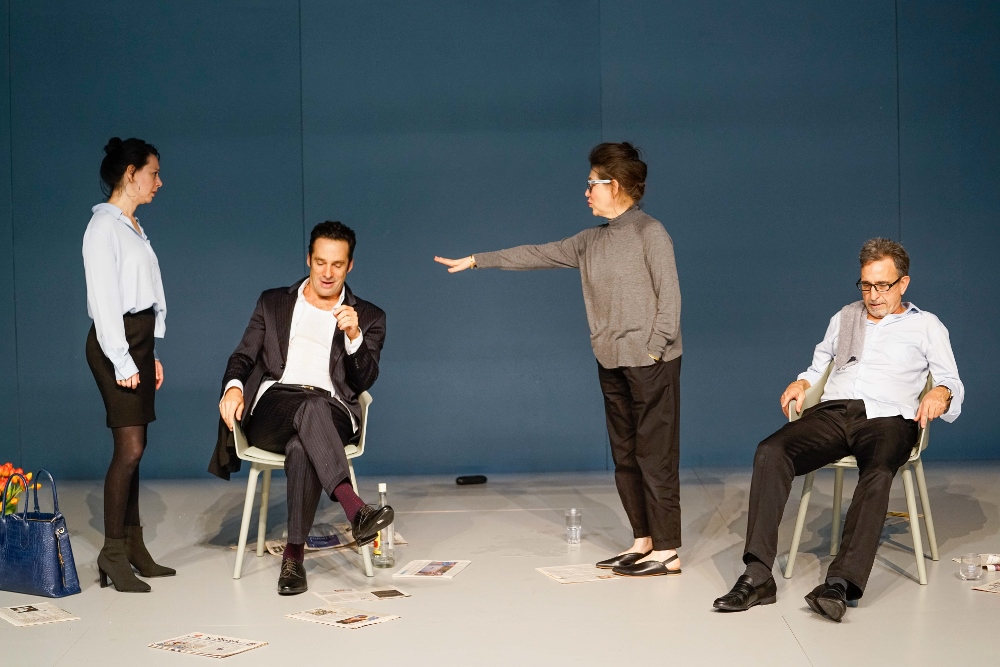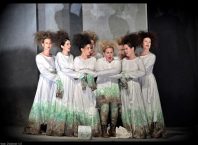
Tight, precise, and brutally hilarious, the Cameri Theatre production of The God of Carnage, directed by Gadi Roll, focuses its penetrating gaze on a quartet of successful humans in their natural habitat, to find that social awareness, egalitarian values, compassion, and even basic good manners, are merely a painfully thin veneer that is easily shattered. Yasmina Reza’s play was originally written in French and premiered in 2006 in a German-language production directed by Jürgen Gosch. Yet its scathing depiction of the manners and foibles of the upscale segments of society – the art lovers, music appreciators, theatre goers, and pursuers of social justice – remains acutely contemporary and relevant. Clear and fresh, Dori Parnas’s translation to Hebrew flows freely in this fast-paced, text-driven play, evoking a sense of immediacy and familiarity. Despite the retention of its characters’ French names (as in the original), it feels as though it might well be about the Israeli couple next door. The entire play takes place over the course of a single evening in one room – it is literally a chamber piece, illuminated by superb performances by the quartet of actors – Keren Mor, Ohad Shahar, Ola Schur-Selektar and Yuval Segal.
The play opens in mid-action, as Annette (Schur-Selektar) and Alain (Segal) stand stiffly in the living room of their hosts Veronique (Mor) and Michel (Shahar), whose son Bruno has been injured by their son Ferdinand. The two couples meet to discuss the incident and attempt, in an atmosphere of concern and understanding, to reach a mutually agreeable conclusion. There is a palpable feeling of discomfort, which is enhanced by Adam Keller’s stark, almost abstract set design. The walls are utterly bare, and the feeling of a living room is referenced by the presence of a laptop, several stacks of heavy art books, two vases of tulips incongruous in their lush beauty, and four simple chairs; altogether evoking urban minimalist chic with an underlying sense of something more claustrophobic and menacing.

Costume designer Orna Smorgonsky captures the nuances of upscale fashions, making the fine distinction between the hosting and visiting couple. Annette and Alain look like they have come straight from work; he’s in a dark suit, and she is in a black pencil skirt, black stocking and heels, clutching a large, expensive-looking bag. Michel is more casual in shirt sleeves, while Veronique wears the uniform of politically progressive privileged women – a well-made, loosely cut sweater topping black trousers, with flat, comfortable, yet elegant shoes. They look like they could be our neighbors; they look like they could be us. Their predicament is also very familiar: a playground fight between 11-year-olds. The injury to Bruno is relatively serious, Ferdinand hit him with a bamboo stick, damaging two teeth. Yet Veronique and Michel have chosen to pursue a very civilized and cultured course of action, talking things over with Ferdinand’s parents.
It is all very polite as Annette professes her gratitude for the invitation to talk, and Michel plays host, offering coffee and apple-pear clafouti, as if this were just any other social occasion. Yet the tension is there, as well as nearly invisible fissures in the relationships of the couples themselves. Michel offers coffee, yet asks Veronique to bring it out, rather than doing it himself. Alain’s phone rings, and he takes the call, effectively shutting down the discussion and forcing the others to wait for him. The conversation, and non-verbal communication around the ceremony of the clafouti is classic upscale social interaction, complete with Veronique’s subtle yet significant looks at Michel as he serves himself a big piece of cake, and Alain’s blithe opportunism making itself felt as in complete obliviousness to the gravity of his son’s actions, he calls out happily that “at least we got a recipe” out of this incident. Once the conversation moves beyond cake, culture is seriously challenged by conflict.

All four performances were very strong, yet I felt that the text gives somewhat more of an emotional range and development to the two women, something that also relates to the play’s themes. Keren Mor’s depiction of Veronique, with her commitment to open-mindedness, justice, and responsibility, is hilariously precise, in her tone and body language, down to the very tiny sliver of cake she cuts for herself, because of course, she is also very aware of her health and figure. Detailed and nuanced, Mor constructs a very solid, credible character, sweeping the viewer away with her when she goes off the rails, and touching the heart in her more vulnerable moments. Veronique and Michel appear to be the better parents – after all, their son was not the aggressor – and their relationship more conventionally supportive. Yet part of the fascination of this play is the way that the alliances shift. When Michel, the avuncular, generous host, goes so far as to console Annette and Alain with the sentiment that the situation could have been reversed, it could have been Bruno who hit another child – Veronique is horrified. The tensions escalate, and the situation deteriorates.
Ola Schur-Selektar delivers a brilliant performance as Annette, slowly revealing the different aspects of the character as the narrative unfolds, in a magnificently comic and tenderly vulnerable crescendo. Muted and restrained, Annette is the very image of a concerned parent, tense and apologetic for her son’s behavior. She attempts to placate and bond with Bruno’s parents, admiring Veronique’s collection of art books, and finding that she shares with her a mutual admiration of Francis Bacon. Yet as the evening progresses, she raises pointed questions regarding culpability and responsibility, revealing more of the feelings beneath the carefully contained exterior. Eventually, it all bursts out, in one way and another, exquisitely portrayed and very, very funny. Some of my favorite moments were when, in a show of advanced urban survival skills, Annette drunkenly slips to the floor with her glass of rum held gracefully aloft. Yuval Segal’s Alain is an alpha male par excellence, a lawyer who is constantly on the phone, with no qualms about his own rudeness, or his son’s violent action.
Reza’s play delights in bashing the hypocrisy of the socially conscious, cultured, privileged classes, and also comes down hard on concepts of masculinity. Both men express their admiration for aggressive masculinity, and it is reflected in their actions as well. Yet the women are also complicit in this world view. I feel compelled to agree with Annette, who says towards the end of the play (paraphrase of the Hebrew text): “mistakes were made, on both sides.” Clever, tense, wild, and funny, the play holds up a mirror to contemporary culture, and is as thought-provoking as it is entertaining.
The God of Carnage
By Yasmina Reza
Directed by Gadi Roll, after Jürgen Gosch; Translation: Dori Parnas; Set Design: Adam Keller; Costume Design: Orna Smorgonsky; Lighting Design: Felice Ross; Cast: Keren Mor, Ohad Shahar, Ola Schur-Selektar, Yuval Segal





